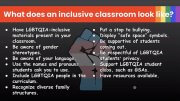Since 2005, when the American Psychological Association (APA) issued an official brief on lesbian and gay parenting, political correctness has demanded that all agree with the spurious assessment that children of homosexual parents do fine. The APA declared, “A growing body of scientific literature demonstrates that children who grow up with one or two gay and/or lesbian parents fare as well in emotional, cognitive, social, and sexual functioning as do children whose parents are heterosexual.
Children’s optimal development seems to be influenced more by the nature of the relationships and interactions within the family unit than by the particular structural form it takes.” In a fit of concurrence, elite opinion-makers, academics, and those in the mainstream media voiced their wisdom by declaring that any household structure works well as long as there are loving relationships within the family unit.
In the absence of research to the contrary and a barrage of positive media images of homosexuals in family settings, public attitudes were manipulated into widespread acceptance of same-sex parenting. The few lone dissenting voices were harassed and discredited.
But the prestigious Social Science Research journal recently published highly credited research that counters the prevailing public and scientific attitudes. Loren Marks, of Louisiana State University, authored “Same-Sex Parenting and Children’s Outcomes: A Closer Examination of the American Psychological Association’s Brief on Lesbian and Gay Parenting,” which uses objective scientific methods to examine the APA assertion about the outcomes of homosexual parenting. Marks’ research calls into question the validity of the research methods and analysis of the 59 published studies cited by the APA.
Marks concluded that the APA assertions about homosexual parenting were not empirically warranted — i.e., the data presented doesn’t validate their hypothesis. He found that the sampling that these researchers used was not representative: the samples are too small, they do not include data of the comparison groups, and the diversity of homosexual parenting studies was dismissed. In addition, only a limited scope of children’s outcomes was studied. Furthermore, the research lacked the statistical power expected by APA standards.
Research Samples on Lesbian and Gay Parenting Not Representative
- Samples are too small. Marks argues that “more than three-fourths (77%) of the studies cited by the APA brief are based on small, non-representative, convenient samples of fewer than 100 participants. Many of the non-representative samples contain far fewer than 100 participants.”
- Samples did not include heterosexual comparison groups. Marks finds that “many same-sex parenting researchers did not use marriage-based, intact families as heterosexual representatives, but instead used single mothers.” That is to say, outcomes for married, intact mom-dad families were not the basis for comparison in the research studies to the same-sex parents; instead, same-sex and single-mother households were compared.
- Study samples did not consider the diversity of homosexual parents. A great amount of research has paid close attention to the diversity of heterosexual-parent families in terms of their various family structures (married intact families, cohabiting, divorced, step- and single-parent families), economic and educational levels, race, and so forth. However, the homosexual-parents studies are “biased toward well-educated, privileged, white women with high incomes.” Marks noted that these factors have plagued other same-sex parenting studies as well.
Lesbian or Gay Parent’s Children Outcomes Not Fully Researched
- The focus of most studies was on parental outcomes, not children’s. The APA claimed, “Not a single study has found children of lesbian or gay parents to be disadvantaged in any significant respect relative to children of heterosexual parents.” (Apparently, few eyebrows were raised at the categorical denial of “any” negative findings whatsoever.) Appallingly, the research supporting this argument did not research children’s outcomes. Marks argues that some studies “focused on fathers’ reports of fathers’ values and behaviors, not on children’s outcomes — illustrating a recurring tendency in the same-sex parenting literature to focus on the parent rather than the child.”
- The long-term outcomes of children of lesbian and “gay” parents were not fully researched. Studies have shown that in the case of cohabiting families and “two-biological-parent married families,” the differences in children’s outcomes increase in significance as the children grow older. This indicates the importance of the examination of long-term outcomes. Marks supposes that “the likelihood of significant differences arising between children from same-sex and married families may also increase across time — not just into adolescence, but into early and middle adulthood.”
Same-Sex Parenting Research Lacked Statistical Power Expected by APA Standards
- In his most pivotal criticism of the same-sex parenting studies, Marks’ showed that, rather than large random samples that are representative, the data underlying the APA official brief consisted of small, select convenience samples repeated by different researchers of same-sex families. According to Marks, “[t]he 2005 APA Brief seems to draw inferences of sameness based on the observation that gay and lesbian parents and heterosexual parents appear not to be statistically different from one another based on small, non-representative samples — thereby becoming vulnerable to a classic Type II error … the logic behind replication is undermined.” He used Lerner and Nagai (2001)’s book-length examination of same-sex parenting studies as the supportive argument. In their work, Lerner and Nagai indicate that 17 of the 22 same-sex parenting comparison studies they reviewed had been designed in such a way that the odds of failing to find a significant difference (between homo- and heterosexual groups) was 85% or higher.
In conclusion, Loren Marks’ “Same-Sex Parenting and Children’s Outcomes: A Closer Examination of the American Psychological Association’s Brief on Lesbian and Gay Parenting” serves as a careful scientific examination of the flaws of the APA’s untenable assertion that “[n]ot a single study has found children of lesbian or gay parents to be disadvantaged in any significant respect relative to children of heterosexual parents.” Any finding as extreme as this one cannot help but violate the common sense of ordinary folks. It simply bears out what many have come to see as the perfidy of the educated elites’ attempts to foist off on the public views that conform to their biased beliefs — however unreasonable — rather than views that conform to the facts. Marks’ study proves yet again the old adage: “If something seems too good to be true, it generally is.”
 Janice Shaw Crouse, Ph.D. is author of Children at Risk (2010) and Marriage Matters (2012). She heads the think-tank for Concerned Women for America. Page Printed with Author’s permission from The American Thinker
Janice Shaw Crouse, Ph.D. is author of Children at Risk (2010) and Marriage Matters (2012). She heads the think-tank for Concerned Women for America. Page Printed with Author’s permission from The American Thinker




